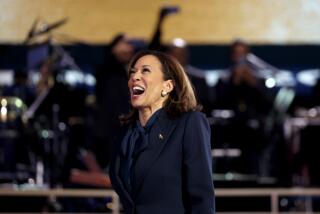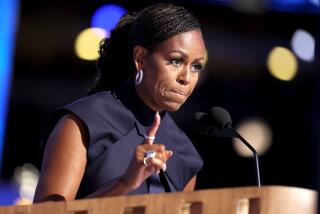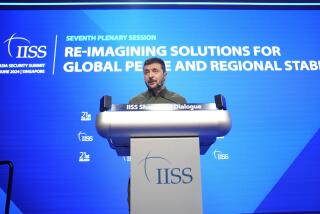First Lady, in Blunt Talk, Stresses Rights
- Share via
BEIJING — First Lady Hillary Rodham Clinton answered criticism of her trip to the U.N. Fourth World Conference on Women here with a rousing speech Tuesday that indirectly condemned China’s population control policies while emphasizing the importance of family.
Appearing before 1,500 delegates from around the world despite objections from both human rights advocates--who urged a boycott because of China’s coercive birth control measures, among other issues--and American conservatives who called the U.N. meeting radical and anti-family, Mrs. Clinton cut to the basic issue of the international gathering.
“If there is one message that echoes forth from this conference,” she declared, “let it be that human rights are women’s rights. And women’s rights are human rights, once and for all.”
In her second public address here--she spoke earlier at a forum on women’s health--Mrs. Clinton listed crimes against women that have not been considered human rights violations because of persistent cultural legacies, from bride burning and genital mutilation to wartime rape and female infanticide.
Although the First Lady did not mention China or any other country by name, her references to China’s strictly enforced one-child policy were clear as she again sounded themes she had raised at the women’s health forum.
“It is a violation of human rights when women are denied the right to plan their own families, and that includes being forced to have abortions or being sterilized against their will,” she said to applause.
She did, however, name China directly in her criticism of the treatment of participants in both the U.N.-sponsored meeting and the gathering of 23,000 members of non-governmental organizations tied to it.
“It is indefensible that many women in non-governmental organizations who wished to participate in this conference have not been able to attend--or have been prohibited from fully taking part,” she said, speaking slowly and forcefully to the international audience.
Later, Mrs. Clinton praised the delegates at the non-governmental forum for fighting Chinese red tape and security restrictions to get to the remote conference site in Huairou, a sleepy suburb 35 miles north of the Chinese capital.
“I know that getting here was far from easy,” she said in a speech in Huairou today, to the cheers of the forum’s delegates. “Many of you endured severe frustrations as you pursued your work.”
For many participants, Mrs. Clinton’s appearance at the controversial site was a welcome endorsement of the growing role of the non-governmental organizations in international meetings on women’s issues.
Mrs. Clinton’s blunt remarks earlier surprised some observers, who had expected her to take a low-key stance in a time of precarious U.S.-China relations.
“I thought she would have to take a more politically correct position since she is a politician,” said Phuntsok Dolma, an exiled Tibetan living in Massachusetts who has been a target of police surveillance and intimidation while at the conference. “But what she said was very courageous and meant a lot to our people.”
Human Rights Watch/Asia, one of the groups that had urged Mrs. Clinton to stay away from Beijing, applauded her “powerful defense of human rights” but expressed reservations about their effect.
Mrs. Clinton also appeared to have deflected, at least for now, critics who condemn the conference itself as anti-family; they object to language in the conference’s proposed Platform for Action that advocates birth control and recognition of the value of women’s work outside the home.
If women are healthy, free from violence and have an equal chance to work, families will flourish, she said. “And when families flourish, communities and nations will flourish. That is why every woman, every man, every child, every family and every nation on our planet has a stake in the discussion that takes place here.”
Even the Vatican, which has strongly contested references to reproductive health and family planning in the proposed platform, endorsed the address. Mary Ann Glendon, head of the Holy See delegation, said that she was pleased by the speech, particularly the sections that spoke of the protection of motherhood.
“When I heard the speech, I wondered if she [Mrs. Clinton] had somehow discovered what we were going to say,” Glendon said.
The Chinese government did not immediately react to the speech, giving it a mere two-second mention on the national evening news. Mrs. Clinton’s remarks, including a succinct civics lesson on the virtues of democracy, will probably not be reported in the state-run press here.
With U.S.-Chinese relations still delicate after a summer of conflict over Taiwanese President Lee Teng-hui’s visit to the United States and the detention of U.S. human rights activist Harry Wu, some worry that Mrs. Clinton’s straightforward remarks might damage recent diplomatic fence-mending efforts.
But Madeleine Albright, the U.S. ambassador to the United Nations and the chair of the American delegation at the conference, said the U.S. relationship with China is “very broad,” suggesting that economic and other ties will help keep the relationship intact.
More to Read
Sign up for Essential California
The most important California stories and recommendations in your inbox every morning.
You may occasionally receive promotional content from the Los Angeles Times.










